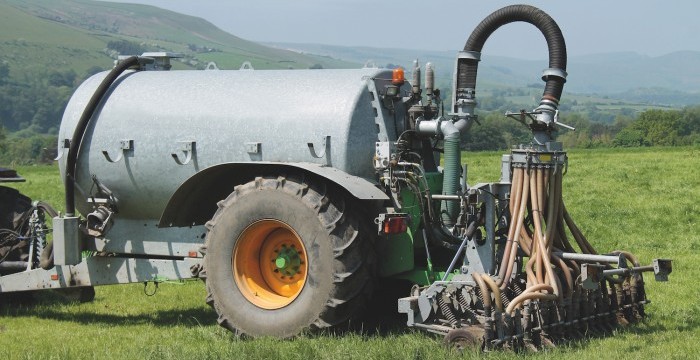The NPA has welcomed Defra’s clarification on the Farming Rules for Water (FRfW), which it said should go some way to clearing up the confusion that surrounded the interpretation of the rules last year.
Defra said its guidance, which can be viewed here, makes it clear that it does not intend to ban autumn manure spreading through the FRfW, as soil and crop need for nitrogen (N) can now be based on an annual crop cycle, rather than an immediate requirement.
The guidance ‘tells the Environment Agency about criteria that they should consider when they assess if they should take enforcement action under the regulations’.
“If the Environment Agency determines that land managers have followed this guidance then the Secretary of State does not normally expect them to take enforcement action,” it says, adding that enforcement of individual cases remains a matter for the Environment Agency to determine based on the case’s particular circumstances.
The guidance stresses that the EA will ‘generally prioritise giving advice and guidance before taking enforcement action’, although it ‘may still escalate and impose civil or criminal sanctions if appropriate, in particular if advice, guidance and warning letters do not achieve the necessary changes in behaviours’.
It sets out what farmers need to do when it comes to applying the rules for the use of organic manure and manufactured fertiliser to agricultural land. This includes:
- Land managers should be able to demonstrate that they have planned applications of organic manure or inorganic fertiliser in accordance with the farming rules for water. This includes for example, a nutrient management plan or other written plan.
- They should consider soil and crop need for nitrogen (N) based on an annual crop cycle and plan to avoid applying organic manures that raise the Soil Phosphorus Index (soil P index) above index level 3 or target levels for soil and crop on land (whichever is higher) over a crop rotation – unless they can demonstrate that it is not reasonably practicable to do so OR they have taken all appropriate reasonable precautions to help mitigate against the risk of diffuse agricultural pollution.
- Plans should take different approaches to avoid significant risk of agricultural diffuse pollution due to nitrate leaching depending on the readily available nitrogen (RAN) content of organic manures. FYM is considered to have a low RAN content (<30%), whilst slurry is considered to have a high RAN content (>30%).
- For applications of low RAN organic manure the potential nitrate leaching risk linked to application rate will not be considered significant if all appropriate reasonable precautions are taken to help mitigate against the risk of diffuse pollution. For applications of high RAN organic manure the potential nitrate leaching risk linked to the application rate will not be considered significant if one of 3 criteria are met.
- There will be a ‘closed period’ when application rate limits apply for high RAN organic manure
- Land managers should plan to have established green cover by 15 October as a reasonable precaution to help prevent agricultural diffuse pollution resulting from applications to that land.
- If applying low RAN organic manures, land managers may justify delaying incorporation if it is not practical to do so within 12 hours of spreading and if they have assessed relevant risk factors as not being significant over the application and incorporation period. There may be circumstances where it may not be appropriate to incorporate organic manures.
Clarity for producers
Lizzie, who, along with Lincolnshire producer Sam Godfrey, has been part of a group working with other farming bodies, Defra and the agency on the updated guidance, said: “We have been working with partners from across the industry for months, to find solutions after the confusion caused by the interpretation of FRfW and subsequent Regulatory Position Statement 252, last year.
“This guidance issued by DEFRA will enable the industry to maximise the utilisation of manures and organic materials, with only more limited use conditions and restrictions where serious harm can be caused to the environment.
“It does provide more clarity and comes as a relief for many under-pressure pig producers who have been anxiously waiting for this clarification, while their businesses have been suffering for many months.
“As we live through a time of commodity inflation, including increased fertiliser and other input costs for farm businesses, these organic materials and manures have an even more crucial role in supporting agricultural production, and for maintaining soil health
“We would like to thank the Secretary of State and the team at DEFRA who facilitated a route for industry and government to collaboratively find a solution that has enabled the guidance to be clarified.”
“The Defra guidance will be reviewed again before September 2025. Producers should consider that if they can afford to store more organic manure or establish more resilient arrangements before then, it would be prudent to do so.”




